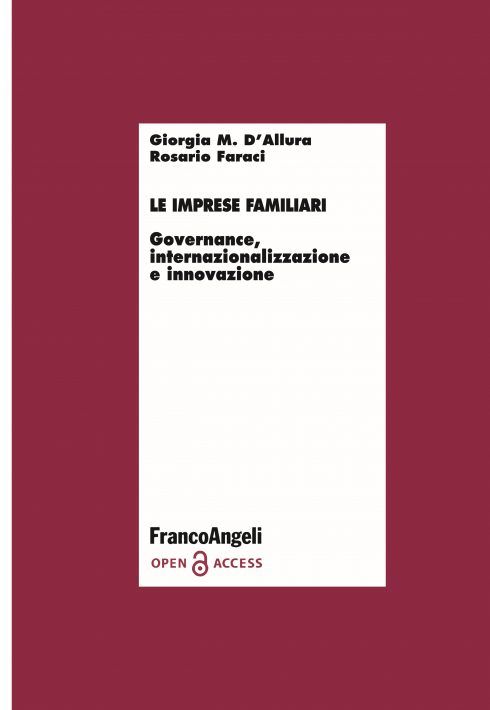Successful family business
A book provides an organised summary of the theme of family businesses, with a focus on innovation and internationalisation
Family and business pairing that is often inseparable ot to mention successful, under certain conditions, which need to be investigated and understood, above all within the context of a complex period beset with a host of challenges, like those that characterise the recent past and present.
It is therefore interesting to read “Le imprese familiari. Governance, internazionalizzazione e innovazione” (Family businesses. Governance, internationalisation and innovation) edited by Giorgia M. D’Allura and Rosario Faraci. Indeed, the work offers a deeper look into the specific features of family businesses, and the growth trajectories of such organisations, in terms of internationalisation and innovation. The specific objective of the book, then, is to understand the role that entrepreneurial families play and have played in the management of their companies, paying particular attention to management and planning structures. This role changes from company to company, and tends to be characterised by a specific focus on the destiny of the business, which is of course inextricably linked to that of the family.
The book presents the topics in a clear manner, and begins by defining the key elements of the subject in question, before moving on to address the various aspects of management, and the potential relationships that exist between the organisation of production, internationalisation and innovation. The main case study presented concerns an agri-food company (Cantine Nicosia in Sicily), but the book is also enriched by an appendix which contains the works presented at the IFERA Research Development Workshop, the theme of which was Family, Firms and Institutional Context: Analyzing the role of the context in the development of the family unit for Family Business Research. In this section of the book, therefore, readers can find a collection of essays that address the experience of other companies, as well as examining certain aspects of the family-business union.
The editors of the book write: “Today (…), scholars view family businesses as a ‘signifier for many meanings'”. A happy synthesis of two entities – the business and the family – which in Italy often combine to create a number of very unique and often winning characteristics; a business culture that draws inspiration for present and future innovation from the past.
Le imprese familiari. Governance, internazionalizzazione e innovazione (Family businesses. Governance, internationalisation and innovation)
Giorgia M. D’Allura Rosario Faraci
Franco Angeli, 2018


A book provides an organised summary of the theme of family businesses, with a focus on innovation and internationalisation
Family and business pairing that is often inseparable ot to mention successful, under certain conditions, which need to be investigated and understood, above all within the context of a complex period beset with a host of challenges, like those that characterise the recent past and present.
It is therefore interesting to read “Le imprese familiari. Governance, internazionalizzazione e innovazione” (Family businesses. Governance, internationalisation and innovation) edited by Giorgia M. D’Allura and Rosario Faraci. Indeed, the work offers a deeper look into the specific features of family businesses, and the growth trajectories of such organisations, in terms of internationalisation and innovation. The specific objective of the book, then, is to understand the role that entrepreneurial families play and have played in the management of their companies, paying particular attention to management and planning structures. This role changes from company to company, and tends to be characterised by a specific focus on the destiny of the business, which is of course inextricably linked to that of the family.
The book presents the topics in a clear manner, and begins by defining the key elements of the subject in question, before moving on to address the various aspects of management, and the potential relationships that exist between the organisation of production, internationalisation and innovation. The main case study presented concerns an agri-food company (Cantine Nicosia in Sicily), but the book is also enriched by an appendix which contains the works presented at the IFERA Research Development Workshop, the theme of which was Family, Firms and Institutional Context: Analyzing the role of the context in the development of the family unit for Family Business Research. In this section of the book, therefore, readers can find a collection of essays that address the experience of other companies, as well as examining certain aspects of the family-business union.
The editors of the book write: “Today (…), scholars view family businesses as a ‘signifier for many meanings'”. A happy synthesis of two entities – the business and the family – which in Italy often combine to create a number of very unique and often winning characteristics; a business culture that draws inspiration for present and future innovation from the past.
Le imprese familiari. Governance, internazionalizzazione e innovazione (Family businesses. Governance, internationalisation and innovation)
Giorgia M. D’Allura Rosario Faraci
Franco Angeli, 2018
